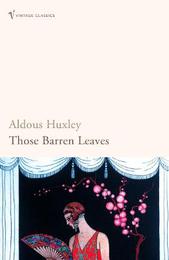
|
Those Barren Leaves
Paperback / softback
Main Details
| Title |
Those Barren Leaves
|
| Authors and Contributors |
By (author) Aldous Huxley
|
|
Introduction by David Bradshaw
|
| Physical Properties |
| Format:Paperback / softback | | Pages:336 | | Dimensions(mm): Height 198,Width 129 |
|
| Category/Genre | Classic fiction (pre c 1945) |
|---|
| ISBN/Barcode |
9780099477792
|
| Classifications | Dewey:823.912 823.912 |
|---|
| Audience | |
|---|
|
Publishing Details |
| Publisher |
Vintage Publishing
|
| Imprint |
Vintage Classics
|
| Publication Date |
7 April 2005 |
| Publication Country |
United Kingdom
|
Description
In a renovated Italian palace set above the blue of the sea, the Junoesque figure of Mrs Aldwinkle moves among her guests. These include a poet who earns his living editing The Rabbit Fancier's Gazette; a popular novelist who records every detail of her affair with another guest as future literary material; an aging philosopher who pursues a wealthy yet mentally-disabled heiress and a pair of naive and charming young lovers. Deliciously satirical, Those Barren Leaves bites the hands of those who dare to posture or feign sophistication and is as comically fresh today as when it was first published.
Author Biography
Aldous Huxley was born on 26th July 1894 near Godalming, Surrey. He began writing poetry and short stories in his early twenties, but it was his first novel, 'Crome Yellow' (1921), which established his literary reputation. This was swiftly followed by 'Antic Hay' (1923), 'Those Barren Leaves' (1925) and 'Point Counter Point' (1928) - bright, brilliant satires in which Huxley wittily but ruthlessly passed judgement on the shortcomings of contemporary society. For most of the 1920s Huxley lived in Italy and an account of his experiences there can be found in 'Along The Road' (1925). The great novels of ideas, including his most famous work 'Brave New World' (published in 1932 this warned against the dehumanising aspects of scientific and material 'progress') and the pacifist novel 'Eyeless in Gaza' (1936) were accompanied by a series of wise and brilliant essays, collected in volume form under titles such as 'Music at Night' (1931) and 'Ends and Means' (1937). In 1937, at the height of his fame, Huxley left Europe to live in California, working for a time as a screenwriter in Hollywood. As the West braced itself for war, Huxley came increasingly to believe that the key to solving the world's problems lay in changing the individual through mystical enlightenment. The exploration of the inner life through mysticism and hallucinogenic drugs was to dominate his work for the rest of his life. His beliefs found expression in both fiction ('Time Must Have a Stop', 1944 and 'Island', 1962) and non-fiction ('The Perennial Philosophy', 1945, 'Grey Eminence', 1941 and the famous account of his first mescalin experience, 'The Doors of Perception', 1954. Huxley died in California on 22nd November 1963.
Reviews"'Extremely clever, with the brilliance we have come to associate with this author' New York Times"
|